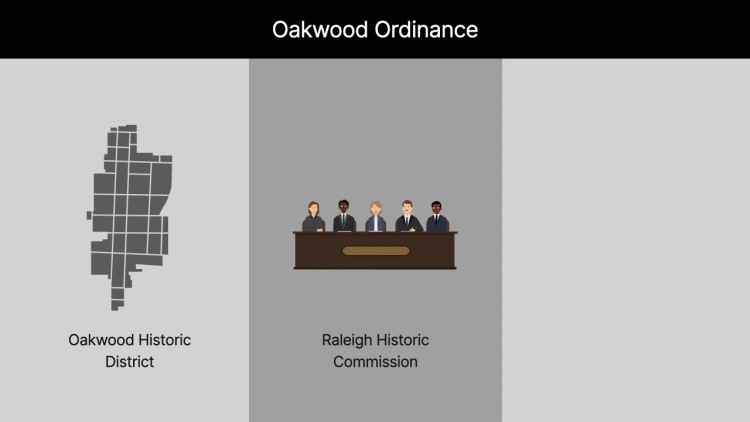A-S-P Associates v. City of Raleigh
North Carolina Supreme Court
258 S.E.2d 444 (1979)
- Written by Anjali Bhat, JD
Facts
North Carolina statutes authorized municipalities to (1) designate historic districts and (2) require that, after such designation, property owners desiring to build a new structure or alter the exterior of an existing structure first obtain permission from a historic-district commission. The statutes required the commissions to have a majority of members who demonstrated special interest, experience, or education in history or architecture. The commissions were not to consider interior arrangement but to prevent only exterior changes that were incongruous with a district’s historic aspects. Accordingly, the City of Raleigh (the city) (defendant) adopted ordinances (the Oakwood ordinances) designating the Oakwood neighborhood as a historic district, establishing the Raleigh Historic District Commission (RHDC), adopting standards to guide the RHDC, and providing penalties for noncompliance. A-S-P Associates (Associates) (plaintiff) owned land within Oakwood and sought a declaratory judgment that the Oakwood ordinances were invalid. Associates argued that the Oakwood ordinances had deprived Associates of its property without due process in violation of the U.S. Constitution and the North Carolina constitution. Associates argued that an aesthetic land-use statute violated due process if the statute lacked relation to health, safety, morals, or general welfare. Associates further argued the Oakwood ordinances did not provide adequate standards for the regulation of private property and impermissibly delegated legislative power to the RHDC. Further, Associates argued that even if the restrictions on existing structures were valid, the restrictions on the construction of new structures were unconstitutional. The superior court granted summary judgment for the city. The court of appeals reversed. The city appealed.
Rule of Law
Issue
Holding and Reasoning (Brock, J.)
What to do next…
Here's why 907,000 law students have relied on our case briefs:
- Written by law professors and practitioners, not other law students. 47,100 briefs, keyed to 996 casebooks. Top-notch customer support.
- The right amount of information, includes the facts, issues, rule of law, holding and reasoning, and any concurrences and dissents.
- Access in your classes, works on your mobile and tablet. Massive library of related video lessons and high quality multiple-choice questions.
- Easy to use, uniform format for every case brief. Written in plain English, not in legalese. Our briefs summarize and simplify; they don’t just repeat the court’s language.





